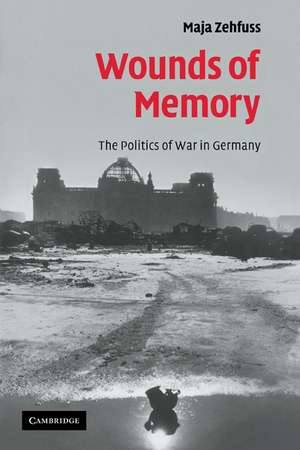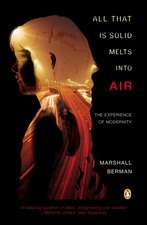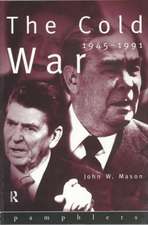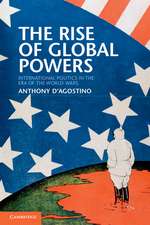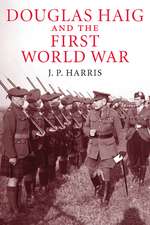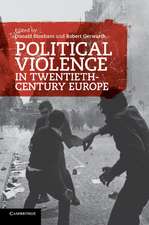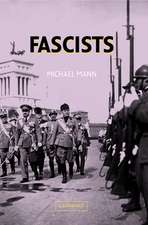Wounds of Memory: The Politics of War in Germany
Autor Maja Zehfussen Limba Engleză Paperback – 2 mar 2011
| Toate formatele și edițiile | Preț | Express |
|---|---|---|
| Paperback (1) | 288.04 lei 43-57 zile | |
| Cambridge University Press – 2 mar 2011 | 288.04 lei 43-57 zile | |
| Hardback (1) | 685.92 lei 43-57 zile | |
| Cambridge University Press – 24 oct 2007 | 685.92 lei 43-57 zile |
Preț: 288.04 lei
Nou
Puncte Express: 432
Preț estimativ în valută:
55.12€ • 57.69$ • 45.87£
55.12€ • 57.69$ • 45.87£
Carte tipărită la comandă
Livrare economică 31 martie-14 aprilie
Preluare comenzi: 021 569.72.76
Specificații
ISBN-13: 9780521174466
ISBN-10: 0521174465
Pagini: 312
Dimensiuni: 152 x 229 x 18 mm
Greutate: 0.46 kg
Editura: Cambridge University Press
Colecția Cambridge University Press
Locul publicării:Cambridge, United Kingdom
ISBN-10: 0521174465
Pagini: 312
Dimensiuni: 152 x 229 x 18 mm
Greutate: 0.46 kg
Editura: Cambridge University Press
Colecția Cambridge University Press
Locul publicării:Cambridge, United Kingdom
Cuprins
Preface; 1. Speaking of war and memory; 2. Forgetting to remember?; 3. Wounds of memory; 4. The truth of memory; 5. Times of memory; 6. Memory, uncertainty, responsibility.
Recenzii
Review of the hardback: 'Wounds of Memory is a timely exploration of the construction of collective memory and its function in legitimizing politics. Yet it is also much more: an inspiring and innovative contribution on the tricky question of German national identity. It deserves to be widely read and received not only in academic circles - and certainly also in the public discourse on wartime memories in Germany.' Mathias Albert, Bielefeld University
Review of the hardback: 'A controversial book that employs a reading of German novels about the Second World War to examine how the use of the memory or imagining of war works in contemporary politics. The impact is not purely in terms of the high quality of the intellectual analysis and scholarship, but the strong sense of commitment and the refusal of any easy ways out that characterise Zehfuss' work. Audiences will be moved and views changed by this.' Jenny Edkins, Professor of International Politics, University of Wales, Aberystwyth
Review of the hardback: 'This is a strong addition to the growing literature on historical remembrance in contemporary Germany. Zehfuss focuses on war novels, and in particular on those which show the suffering of ordinary soldiers, civilians, refugees, and children. This fictional repertoire is selective. 'A cruel but normal war' is what fiction records as a form of historical remembrance. The author aims at a Derridean 'overturning', reversing the previous eclipse of the Holocaust by the Resistance, and facing squarely what the Second World War looks like when it is not eclipsed by the Holocaust. She then returns to the Holocaust, to see what this new deconstructed geometry looks like. The result is a powerful account of the fluidity of historical narratives, carried by the readers and writers of fiction in Germany, and of their implications for discussions of a range of social and political issues today.' Jay Winter, Charles J. Stille Professor of History, Yale University
Review of the hardback: 'A controversial book that employs a reading of German novels about the Second World War to examine how the use of the memory or imagining of war works in contemporary politics. The impact is not purely in terms of the high quality of the intellectual analysis and scholarship, but the strong sense of commitment and the refusal of any easy ways out that characterise Zehfuss' work. Audiences will be moved and views changed by this.' Jenny Edkins, Professor of International Politics, University of Wales, Aberystwyth
Review of the hardback: 'This is a strong addition to the growing literature on historical remembrance in contemporary Germany. Zehfuss focuses on war novels, and in particular on those which show the suffering of ordinary soldiers, civilians, refugees, and children. This fictional repertoire is selective. 'A cruel but normal war' is what fiction records as a form of historical remembrance. The author aims at a Derridean 'overturning', reversing the previous eclipse of the Holocaust by the Resistance, and facing squarely what the Second World War looks like when it is not eclipsed by the Holocaust. She then returns to the Holocaust, to see what this new deconstructed geometry looks like. The result is a powerful account of the fluidity of historical narratives, carried by the readers and writers of fiction in Germany, and of their implications for discussions of a range of social and political issues today.' Jay Winter, Charles J. Stille Professor of History, Yale University
Descriere
This book studies memories of the Second World War articulated in novels to raise important political questions.
